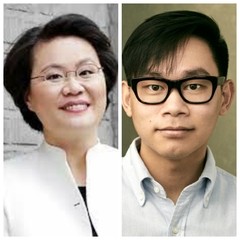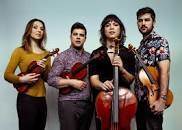|
Back
Natural Incarnations New York
Zankel Hall, Carnegie Hall
10/20/2022 -
Inti Figgis-Vizuelta: Seven Sides of Fire (World Premiere)
Mark Adamo: Last Year (New York Premiere)
Yvette Janine Jackson: Hello Tomorrow! (World Premiere)
Viet Cuong: re(new)al
Jeffrey Zeigler (Cello); Attacca Quartet: Amy Schroeder, Domenic Salerni (Violins), Nathan Schram (Viola), Andrew Yee (Cello); Sandbox Percussion
American Composers Orchestra, Mei‑Ann Chen (Conductor)

M.‑A. Chen/V. Cuong
“We are all here on earth to help others; what on earth the others are here for I don't know.”
W.H. Auden
“How inappropriate to call this planet Earth when it is quite clearly Ocean.”
Arthur C. Clarke
An evening with the American Composers Orchestra is like sprinting through an imaginary landscape, the sky unimaginable colors, trees a thousand feet high, mythical birds, colossal flower-petals breathing out ambrosial perfumes. Yet the only desire of the sprinter–an unfulfilled desire–is to cease sprinting, to inhale the scents for a few minutes, touch the tree‑barks and (in Walt Whitman’s words) “look up with perfect silence at the stars.”
That could never be. Last night’s quartet of works was theoretically linked by the phrase “the natural order”. The copious program notes described traditional Native American fire-extinguishing, different energies, a 21st Century ecological update on Vivaldi. Yet the music, while of varying qualities, had such an extravagance of inspiration, such pitch‑perfect artistry (led by the great Mei‑Ann Chen), and such imagination, that one wanted to yell out, “Stop! Let’s hear this again! Let’s catch our breath.”
Instead we were grounded with inevitable applause, discussions with the composers, an intermission...and the vanishing memory of sounds.
Without score or previous hearings, only my perception was of value. So we start with the (in my ear) least impressive. Not that Yvette Janine Jackson’s Hello Tomorrow! was a bad piece (co‑commissioned by Carnegie Hall). The opening tapes, the brass flatulence, the dreamy orchestral answers were all perhaps impressive, but I didn’t get it.
What I possibly did get was that splendid composer-librettist Mark Adamo and his update on Vivaldi, Last Year. It was composed with two notions in mind: a cello concerto for Jeffrey Zeigler, and Vivaldi’s The Seasons. Mr. Zeigler filled the bill, playing without a stop, virtuosic, colorful, resonating. The original Seasons was another story.
Vivaldi’s Seasons depicted a rural Elysium. And as confident at the world turning around. These days, the seasons are malicious rather than temporal (yeah, climate warming), and this four‑movement piece displayed it. “Winter” here is not snow but extreme weather, the harp, vibraphone and piano interpolating some mysterious precipitation. “Autumn” brings us the mournful Dies Irae, and “Summer” was a kumin in with faint joy.
Mr. Adamo is a fine melodist, and Mr. Zeigler let these melodies develop, soar and mount. One hearing was hardly sufficient.

Attacca Quartet
The first and last works were (for lack of a better word) terrific. Even at a first hearing. Maestro Chen brought forth all the power, both Attacca Quartet and Sandbox percussion quartet blasted through Zankel Hall.
Inti Figgis‑Vizuelta’s Seven Sides of Fire was 16 minutes of incendiary music. The Attacca Quartet and the American Composers Orchestra started tenuously, but suddenly burst open with a power‑driver series of chords. It could have been erupted from Heldenleben or Zarathustra, but this was Ms. Figgis‑Vizuelta’s picture of fire in all its incarnations. The Attacca Quartet rarely used vibrato, lending an eerie sound, ranging from pointillistic “embers” to the incandescence of the four string players giving obviously aleatory sizzling measures. Ms. Chen–even stickless in this so difficult score–cued in with immaculate precision.
This was a sizzling work, the kind from which recovery should have been several minutes.
The final work, Viet Cuong’s re(new)al, had a cute title–but nothing was cute about the Sandbox percussion group and the American Composers Orchestra. “Hydro”, “Wind” and “Solar” energies needed three different percussion consorts. The first was a table with eight crystal glasses, and minor differences of water. The four soloists toasted each other, and then the glasses continued dancing their tones with the counterpoint of an eight‑part Bach fugue.
Whew! Except that the group moved to their next movement, with a snare‑drum centerpiece. The four players, with the usual bass drums, circled and snared and copied each other on that snare drum, and whizzed through the music. And what was this music? Imagine that Stan Kenton or Fletcher Henderson had their Big Bands playing on the sun–all trying to flee away from the flames and keeping their sounds intact.
Finally came “Solar” energy, metallic and ringing instruments, glints of radiance, diaphanous sounds. Glockenspiels and cymbals and an orchestra echoing these hypnotic sounds.
Twas a treasure‑chest of an evening, but each treasure was transient. What was needed was recovery, even that terrible notion, “reflection.” We could still be thankful that, though the notes were ephemeral, and the memory gave a glimmer of its splendor.
Harry Rolnick
|